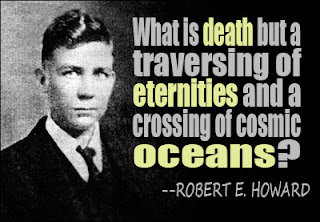Books dealing on Scottish history were easier for me to obtain than those dealing with Irish history, so in my childhood I knew infinitely more about Scottish history and legendry than Irish. I had a distinct Scottish patriotism, and liked nothing better than reading about the Scotch and English wars. I enacted these wars in my games and galloped full tilt through the mesquite on a bare-backed racing mare, hewing right and left with a Mexican machete and slicing off cactus pears which I pretended were the heads of English knights.
- Robert E. Howard, letter to H.P. Lovecraft
Robert E. Howard's Irish fascination is well-known and explored among Howard scholars. Nearly every genre and series he wrote had some connection to Ireland and the Irish: several series starred Irishmen in lead roles, and a few of his most famous stories are set in Ireland. But Ireland is not the only Celtic nation Howard wrote about: Scotland too can boast her share of Howardian heroes and histories.
Howard counted Scottish authors like Arthur Conan Doyle, Robert W. Service, and Walter Scott among his very favourites, and plenty of his favourite non-Scottish authors like Edgar Allan Poe, Harold Lamb, Talbot Mundy, and Lord Dunsany wrote a few Scots tales in their time. As seen above, Scottish history was a significant influence on Howard's imagination. The theosophical writings of Scots Lewis Spence & William Scott-Elliot were foundational to the Thurian and Hyborian Ages of Howard's most famous creations, Kull of Atlantis and Conan of Cimmeria. My Floridian pal Jeffrey Shanks goes into great detail here:
Howard was far from alone in setting his Weird Tales in Scotland: Edmond Hamilton's "The Atomic Conquerors" is a wild yarn which supposes a rather otherworldly origin for the mysterious vitrified forts populating the Scottish wilderness; H. Warner Munn's "The Werewolf's Daughter" is a grand trilogy detailing the adventures of the Werewolf of Ponkert; Weird Tales regular Seabury Quinn even got in on the action with "the Bride of Dewer," a Rumpelstiltskin tale with a tartan twist.
So, on Robert E. Howard's 113th birthday, I wonder: what would a "Scottish" anthology of Robert E. Howard stories look like?

